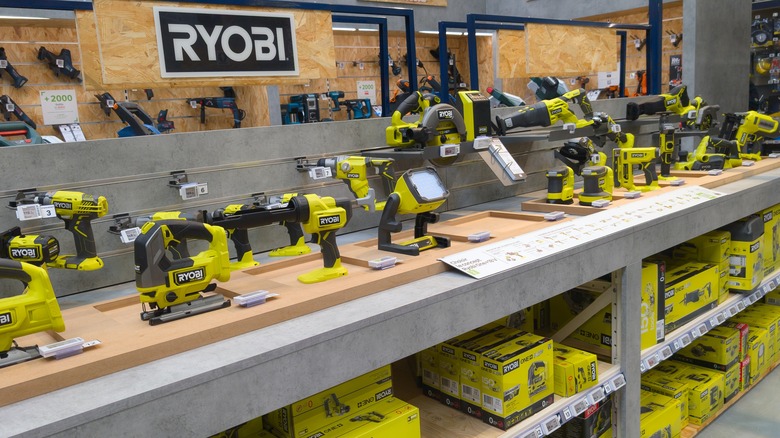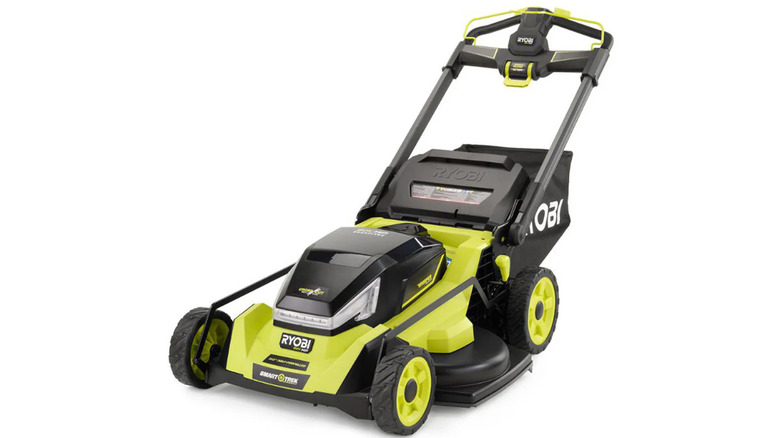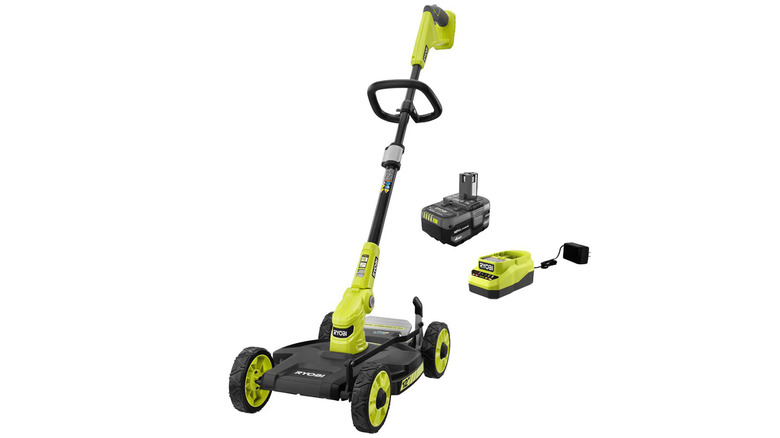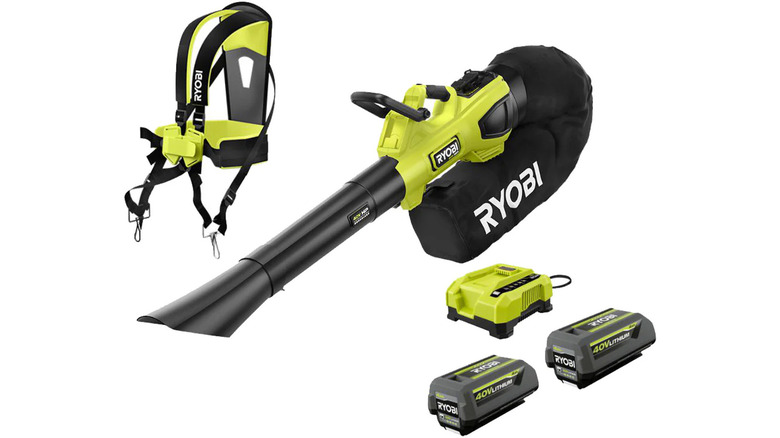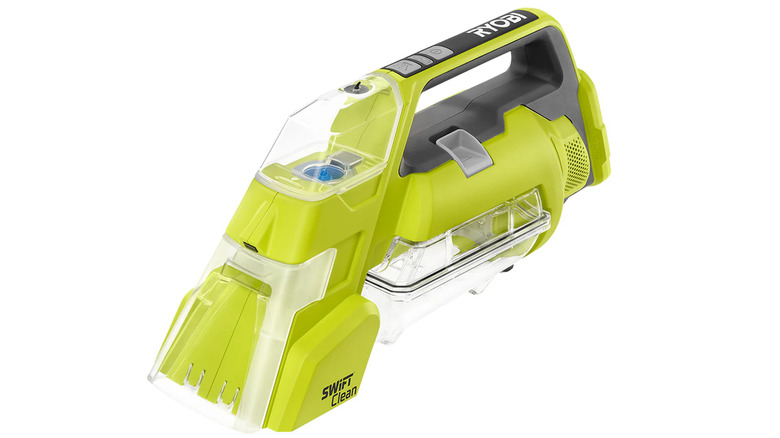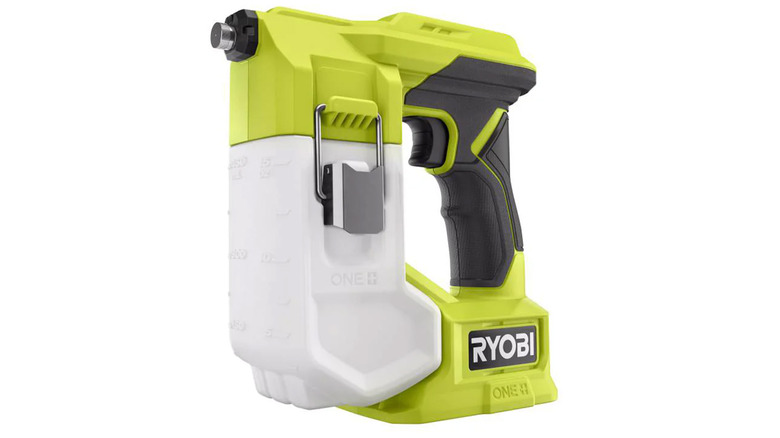5 Ryobi Tools You Should Steer Clear Of (According To Owners)
Anyone who has taken a stroll through a Home Depot in the last half decade has heard of Ryobi. The brand sells its tools exclusively through Home Depot and its website, giving the home improvement retail giant exclusive rights. The debate over whether Ryobi's tools are any good has been mostly settled, with the majority believing that Ryobi is good for the DIY homeowner but probably not suited for professional use. In general, most people like most of the brand's tools.
Ryobi sells a wide range of tools, from its lineup of One+ 18V power tools to its 40V lawn equipment, along with a slew of fun products that the brand has since discontinued. However, like all brands with massive product lineups, not every product makes people happy. Ryobi is as guilty of this as any tool brand, and potentially even more so given its willingness to experiment with things like garage door openers and RC cars. Tons of products have slid into and out of Ryobi's lineup over the years.
Thus, it's only natural that some of them aren't very good or don't scratch the itch that users thought they would. For this list, we looked at user reviews and picked out five products from the 200-300 or so that Ryobi sells which people simply don't like. We sourced user reviews from retail sources like Home Depot and Amazon to see which products people didn't like and why. So, if you're looking to steer clear of some of Ryobi's less impressive tools, here are a few you should probably avoid.
Ryobi 80V HP 30-inch multi-blade mower
Ryobi makes some pretty decent electric lawnmowers. I actually own one, which I purchased in 2019 shortly after I bought my home, and it has held up wonderfully, even if the brand doesn't sell that specific model anymore. In general, people tend to like the 20- to 21-inch deck mowers as they're perfectly serviceable for a suburban lawn. The larger 30-inch model, on the other hand, has its fair share of detractors. It garners a 3.9 out of 5 rating on Home Depot, making it one of the lower-rated Ryobi lawnmowers that Home Depot sells.
Users had two primary concerns with this mower. The first is that it uses a gargantuan 80V battery that looks something like a small suitcase instead of the 40V batteries that many of Ryobi's other tools use. That needlessly large battery pairs well with the needlessly large mower. With a 30-inch deck, users found that this mower is difficult to maneuver in yards with lots of trees or other obstacles.
The other big issue is that this is a zero-turn mower, which means it can spin on a dime. This works great for flat yards and even adds back some of the agility lost because of it being a larger deck. Those with hills or inclines have noted that it's actually rather difficult to control the mower and get nice, clean lines. So, if you have a large, flat lawn, this mower is great. If you have a hilly, irregular lawn with lots of obstacles, shop elsewhere.
Ryobi One+ cordless battery 3-in-1 mower, string trimmer, and edger
This unique little gadget is a prime example of Ryobi's willingness to experiment, although similar products have existed from other brands for a while now. The premise is pretty simple. It's a string trimmer that attaches to a makeshift lawnmower deck. That way, you can trim weeds, edge your sidewalk, and then mow the lawn all with a single tool.
It's a neat idea, especially if you have a tiny yard, but it definitely has its limitations. Users on Home Depot have rated this a very mild 3.5 out of 5. The issues are once again twofold. The first is that this is an 18V product, and the battery life is exceedingly short. As a result, it chews through its battery pretty quickly, necessitating multiple batteries or breaks to charge. For the record, most of Ryobi's yard tools are 40V, while this one uses the same battery as Ryobi's drills. You can infer from context what that means.
The other big issue is quality assurance and reliability. The motor seems to run okay, but many users reported that the tool breaks where the head attaches to the body, resulting in a dead product. Others have noted that the plastic teeth in the shaft that allow the tool to switch between modes wear down easily, resulting in another breakdown. It's a cool idea, but the execution doesn't seem to be there.
Ryobi 40V HP brushless blower/vacuum
The Ryobi 40V HP Brushless Cordless Leaf Blower, Mulcher, and Vacuum is another all-in-one tool that Ryobi hasn't executed well. Consequently, I own the regular 40V cordless leaf blower, and it has helped me do everything from clear yard trimmings from my driveway to cleaning leaves out of my gutters. However, this thing seems overly ambitious and has left people wanting. It holds a 2.7 rating on Amazon and a 3.1 rating on Home Depot, making it one of the brand's lower-rated leaf blowers.
As with the others, the problems according to reviewers are twofold. The first is general reliability issues. A few people noted that the motor burned out after about a year of use, while others reported that the power switch breaks somewhat easily, leaving the blower stuck on whatever setting it was on when the switch broke. In another example, a user reported that the handle broke while taking it out of the box. In short, this one doesn't appear to be Ryobi's most durable product.
The other issue, though mentioned less often, was usability concerns. There were several reports of the blower jamming up in vacuum mode, and one user reported that a hidden safety switch sometimes prevented it from powering on at all. Much like the 3-in-1 mower, trimmer, and edger, this multi-tool has its fans, but a little under half of the folks who bothered to leave reviews didn't like it for one reason or another.
Ryobi 18V One+ SWIFTClean spot cleaner
The Ryobi One+ SWIFTClean Spot Cleaner is a fairly self-explanatory tool. It's a little hand vacuum that spritzes water down and then sucks it back up to clean messes. It uses the same 18V batteries as the brand's other power tools, adding convenience for people who already own Ryobi products. It's also part of Ryobi's cleaning lineup, which features vacuums and other cleaning tools powered by the same battery. Personally, I'm a fan of the Bissell Little Green Machine when it comes to the best upholstery cleaners, but that's just me.
In any case, this one has a 3.7 rating on Home Depot and a similarly low score on Amazon. In this case, nearly all of the complaints were the same. It has enough suction power to pick up dry things, like if your toddler spills Cheerios in the car. However, the suction isn't quite strong enough to get a significant percentage of the water out, leaving surfaces wet. The overwhelming majority of detractors said the same thing: This thing will spray chemicals down but won't pick them all the way back up.
After doing some digging, this seems to be linked to a specific version of the tool. Ryobi has two generations of this product, and people seem to have liked the first generation better, although not by much. The first generation had an agitator that helped with cleanup, but its usage on non-horizontal surfaces was limited, while the second model seems to be the one with all the suction complaints.
Ryobi One+ handheld sprayer
The Ryobi 18V handheld sprayer kit is one of a few products from Ryobi that work like this. Ryobi also had a paint sprayer that was eventually discontinued, and users didn't much like it when it was on sale either. That probably should be your first red flag that Ryobi tools that spray things aren't the best in the brand's lineup. In any case, this general-purpose sprayer is built more for thinner chemicals like cleaners (except bleach), so one would think that it would work a little better since paint is thicker, right?
Technically, that's true. The paint sprayer had a 2.3 user rating when it was out, and the chemical sprayer earns a 3.6 on Amazon and a 3.7 on Home Depot. After looking through both products, it seems the existing chemical sprayer has the same downsides as the paint sprayer, just on a less obnoxious level. Users report being dissatisfied with the pressure, the spray pattern, and the fact that some harsher cleaners tend to mess up the device. Clogs weren't reported nearly as often as they were with the paint sprayer, but the occasional reviewer had an issue with it.
Admittedly, this one might be a case of user error. Ryobi recommends only using water-soluble chemicals with it, and there's a chance that many of the clogs, jams, and issues people experienced came from using undiluted products. In any case, it seems this one is actually about average, but it seems like one where you'll need to read the instructions to make sure you don't break the rules and, ergo, the tool.
